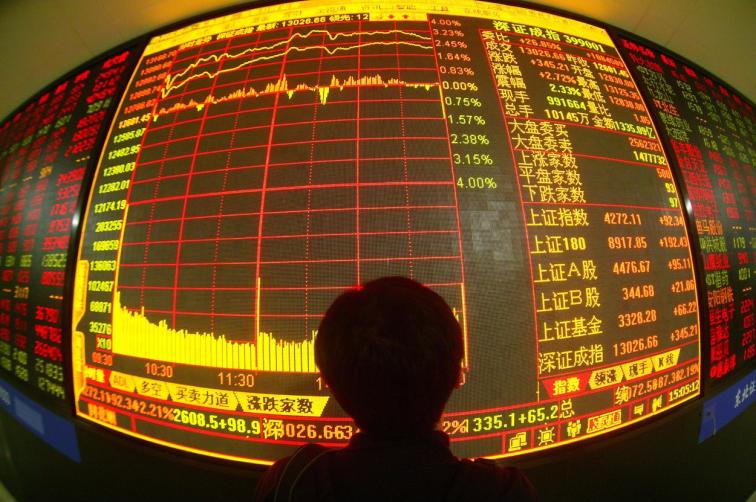Due to food shortages and difficult living conditions, many pets will be abandoned. Stray animals, which lack the ability to survive in the wild, will die from starvation or illness. (Internet image)
[People News] Recently, a video titled Life Like a Dog has gone viral online. In the video, a female blogger uses rhyming sentences to narrate the story of a rural dog who, in hopes of helping its family eat meat, is deceived, exploited, and ultimately abandoned by a circus ringmaster. The tale moved countless netizens to tears.
This video has been entirely censored by the Chinese authorities because it naturally prompts viewers to draw parallels between their own miserable circumstances and the fate of the dog. The dog, burdened with the “shackles of the dream to help its family eat meat,” works tirelessly and fearlessly, only to enrich the ringmaster. In the end, the dog is discarded after falling from a height during a performance. This narrative is a stark reflection of the reality faced by young people in today’s Chinese society—no matter how hard they try, they see no hope for the future.
Recently, a video posted by a netizen showed two pairs of glasses, two cell phones, and two half-finished bottles of beer left on a bridge in Shenzhen, Guangdong. These belonged to two food delivery workers who had just jumped to their deaths. Subtitles in the video revealed that acquaintances of the two said they were both college graduates—one from a prestigious “985” university, and the other from a “211” institution.
Indeed, they no longer need their glasses, nor do they need to endlessly pick up and deliver orders with their phones. Over a decade of rigorous education culminated in their becoming overworked and underpaid laborers. Their sense of personal value became meaningless, their hopes for life increasingly dim. The heartbreaking despair of seeing no light at the end of the tunnel despite relentless effort is palpable.
In another recent TikTok video, a young woman expressed that she had completely lost her motivation. She explained that no matter how hard she worked, she realized she would never become wealthy. The only ways to get rich were to win the lottery or stumble upon an unexpected windfall, but she admitted she had terrible luck and no longer held any hope. She had spent an entire day lying in bed, and the result was no different than if she had worked all day. She wouldn't starve, but she also wouldn’t have any money or hope of ever achieving wealth in her lifetime.
Another young man in the video shared his feelings, saying, "Living is fine, but dying is also okay." He described himself as currently good for nothing, doubting whether he was a waste of space. He even remarked, "If I were gone, it would at least be a relief, like repaying all my debts in advance." He continued, "For ordinary people like me, no matter how much you work or how hard you struggle, you can only manage to survive. If you’re not in debt, that’s already a blessing." Reflecting on his situation, he mentioned that it had been three or four years since he last bought new clothes. He used to see buying a house, getting married, and having children as life’s necessary milestones, like tasks to complete, without which one’s life would be deemed a failure. But now, he felt indifferent about them, saying, "They’re just things—nice to have, but not essential. They’re either out of reach or simply hopeless dreams." He added, "People say hard work always pays off, but the rewards for hard work now are far too small, completely disproportionate to the effort."
These two individuals represent a portion of China’s youth, characterized by numbness and a lack of hope. Because they see no prospects for the future, their shared sentiment is, "No matter how hard we work, we’ll never make any money," and, "The rewards for effort are far too little and completely disproportionate." Their state of mind wavers between "living is fine, but dying is also okay," feeling there is no way out, and harboring a profound sense of despair.
On December 16, a man from Chongqing shared his story, saying he was a graduate student in civil engineering. After graduating, he joined Sunac Real Estate, a Top 4 company in the industry, which emphasized cultivating new hires and focusing on their career development. However, he joined in 2019, just before the COVID-19 outbreak. After enduring 2020, the company faced financial collapse in 2021, and his entire regional office of over 100 people was laid off. He then decided to start his own business, opening a store, which initially performed well. But when he expanded too quickly by bringing in three investors and opening three or four additional locations, the stores suffered heavy losses, leaving him with debts of 100,000 to 200,000 yuan. He lamented, "I’m already 31 years old and feel completely lost. I don’t know what to do!"
On December 17, a netizen from Guangzhou posted on Maimai (a professional networking platform), saying he was 40 years old, a graduate of South China Normal University (a “211” institution), and a frontend developer who had been unemployed for two months. During this time, he had submitted 458 resumes, all of which received no responses. He now goes to the library daily to send out resumes while deceiving his family into believing he still has a job. He reached out to several companies, but South Airlines' outsourcing division required candidates to be under 35, Huya only wanted candidates with three to five years of experience, and NetEase rejected him for being overaged despite an internal referral. Smaller companies also stated they only hire younger applicants. He admitted, "I’m really exhausted." Coming from a rural background, he had struggled to settle in Guangzhou by age 32, had his first child at 34, and after living in Tianhe’s urban villages for 10 years, he could finally afford an old and small apartment. He still has a mortgage to pay, a child who needs schooling, and parents in the countryside who rely on him for support. He pleaded, "I beg society to pay more attention to the unemployed middle-aged group and give us a chance."
These two unemployed individuals have not yet chosen to “lie flat,” but they remain “lost” with no apparent way out. Real estate collapses, entrepreneurial failures, debt, layoffs in the IT industry, unemployment, mismatched skills, and age discrimination—these factors converge to create a dire situation. Middle-aged unemployed individuals must still face family responsibilities, pay mortgages, fund their children’s education, and meet various financial obligations, yet finding a suitable job or project remains extremely difficult. They are trapped in a quagmire.
Some people say that the post-80s and post-95s generations might be the most burdened because they have to work, earn wages, and repay mortgages. All the costs and negative economic prospects seem to weigh heavily on their shoulders. This is attributed to the current dire economic environment. These generations are in their prime working years, yet they face social regression and economic collapse.
Such videos and posts appear frequently, with these examples being just a few recent cases. Although they represent a fraction of the countless related stories, they are highly representative. There are those who have already given up on life, those who have chosen to lie flat after losing faith in hard work, and those who are still struggling despite their despair. Although these groups are at different stages, they share a common trait: feeling “hopeless” about themselves and having no expectations for the future.
All of this is caused by the Chinese Communist Party. As depicted in Life Like a Dog, where a circus boss exploits and ultimately discards a dog, countless young people in China are being harvested and deceived by the CCP. Their own wealth, along with their parents’ resources, are being drained. The CCP has destroyed the normal economic environment, suppressed relevant industries, and stifled private enterprises, leading to real estate collapses, foreign capital withdrawal, declining exports, and massive shutdowns in the catering, hotel, and tourism sectors. As a result, young people cannot find jobs or, if employed, earn wages barely sufficient to survive. Faced with such realities, how can young people possibly earn money and realize their potential? This widespread despair is therefore an unavoidable fact. △
(People News First Published)











News magazine bootstrap themes!
I like this themes, fast loading and look profesional
Thank you Carlos!
You're welcome!
Please support me with give positive rating!
Yes Sure!